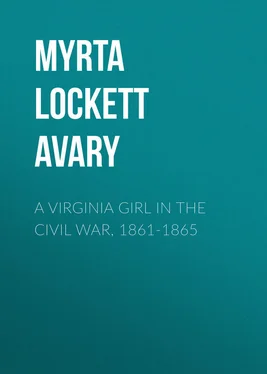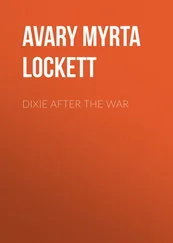Myrta Avary - A Virginia Girl in the Civil War, 1861-1865
Здесь есть возможность читать онлайн «Myrta Avary - A Virginia Girl in the Civil War, 1861-1865» — ознакомительный отрывок электронной книги совершенно бесплатно, а после прочтения отрывка купить полную версию. В некоторых случаях можно слушать аудио, скачать через торрент в формате fb2 и присутствует краткое содержание. Жанр: foreign_antique, foreign_prose, на английском языке. Описание произведения, (предисловие) а так же отзывы посетителей доступны на портале библиотеки ЛибКат.
- Название:A Virginia Girl in the Civil War, 1861-1865
- Автор:
- Жанр:
- Год:неизвестен
- ISBN:нет данных
- Рейтинг книги:5 / 5. Голосов: 1
-
Избранное:Добавить в избранное
- Отзывы:
-
Ваша оценка:
- 100
- 1
- 2
- 3
- 4
- 5
A Virginia Girl in the Civil War, 1861-1865: краткое содержание, описание и аннотация
Предлагаем к чтению аннотацию, описание, краткое содержание или предисловие (зависит от того, что написал сам автор книги «A Virginia Girl in the Civil War, 1861-1865»). Если вы не нашли необходимую информацию о книге — напишите в комментариях, мы постараемся отыскать её.
A Virginia Girl in the Civil War, 1861-1865 — читать онлайн ознакомительный отрывок
Ниже представлен текст книги, разбитый по страницам. Система сохранения места последней прочитанной страницы, позволяет с удобством читать онлайн бесплатно книгу «A Virginia Girl in the Civil War, 1861-1865», без необходимости каждый раз заново искать на чём Вы остановились. Поставьте закладку, и сможете в любой момент перейти на страницу, на которой закончили чтение.
Интервал:
Закладка:
“You wanted to see me, sir?” I asked, stopping at a short distance from him.
He looked up quickly.
“How do you do, Nell?” he said. “I got leave to come from camp to see you to-day. My company got in from Maryland yesterday.”
“Dick!” I cried in amazement; and then I burst into tears. Dick, our dandy, to look like this! Laughter mingled with weeping.
“Good gracious, Nell! what is the matter?” he said.
“Dick, Dick, how you look!”
“Hush, Nell! Good gracious! You’ll have everybody in the dining-room out here to look at me.”
Then I began to beg incoherently that he would go in and dine with me. I think Dick was hungry, but he was not that hungry. In his present garb starvation would not have driven him into a dining-room where ladies were. He looked toward the door with abject terror, and tried to hide himself behind the hat-rack. I was puzzled to know what I should do with him. As a young lady was my roommate it was out of the question to take him to my room, and he positively refused to go into the parlor. While we debated, the dining-room door opened and the ladies filed out into the hall. Unkempt, unshorn, patched, ragged, and dirty, a very travesty of his former foppish self, Dick went through the introductions with what grace he might.
Fortunately my friends who surrounded him were in sympathy with the threadbare Confederate soldier, and ready to help him to the extent of their power. One friend, whose husband had a shirt to spare, gave that to him; another lady found him a pair of socks; some one else contributed a pair of homespun drawers. I was drawn aside and consulted as to the best and most graceful way of conveying these presents to him. They feared that he might be wounded and insulted if the matter were not delicately managed. But Dick was past all that. He accepted the goods the gods provided in the spirit in which they were bestowed, and was radiant with his good luck, and with gratitude to the fair donors. While we held council he had been in Mrs. Rixey’s and Miss Boyd’s hands, and had had a good dinner.
As he stood in the hall ready to go back to camp, Belle Boyd came down the staircase, carrying a large new blanket shawl.
“You must let me wrap you up, lieutenant,” she said, putting the shawl around Dick’s shoulders and pinning it together.
Dick blushed and demurred. A shawl like that was too much – it was a princely gift, a fortune.
“I can’t let you go back to camp in this thin jacket,” she said, “while I have this shawl. It is serving our country, lieutenant, while it protects her soldier from the cold. I may need it? No, no, I can get others where this one came from.”
There was nothing for him to do but to accept it. He looked at me with something of his old humor in his eyes as he started off.
“I’ll be sure to come to see you again, Nell,” he said.
After he left the house we saw him stoop, take off his shoes, and walk off with them in his hands. His feet left marks of blood in the snow. Shoes had been dealt out to the army only that morning, and his feet were so sore that his heavy, ill-fitting brogans were unendurable.
I have heard of many generous deeds like this done by Belle Boyd. Once, when riding out to review some troops near Winchester, she met a soldier, a mere boy, trudging along painfully on his bare feet. She took off her own shoes and made him put them on; they were fine cloth gaiters laced at the side, and trimmed with patent leather. Some one remonstrated; the shoes would not last the boy long enough to pay for her sacrifice.
“Oh,” she said, “if it rests his poor young feet only a little while, I am repaid. He is not old enough to be away from his mother.”
She did not spend another night with us. She seemed to feel that she had the weight of the Confederacy on her shoulders, and took the afternoon train for Richmond.
CHAPTER VI
A FAITHFUL SLAVE AND A HOSPITAL WARD
Not long after this I had to give up my room to Governor Bailey of Florida and his family. They had come on in search of their son, whom they had for months believed to be dead, and who, they had only recently learned, was alive and in the mountains near Culpeper Court-house.
It seems that young Bailey had been shot at the battle of Cedar Mountain and left on the field for dead. An old negro, his body-servant, had carried him off by stealth to a hut in the woods, and there, with such simple resources as he had, had dressed and bandaged the wound. The hut was a mere shell of a house, a habitation for bats and owls; it had been unused so long that no paths led to it, and Uncle Reuben’s chief object in carrying his master there was to hide him from the Yankees. He had no medicine, no doctor, no help, the master was ill for a long time from his wounds and with a slow fever, and through it all Uncle Reuben never left him except at night to forage for both. Food in the Confederacy was far from plentiful, and under the circumstances almost impossible to get. The hardships they endured seem inconceivable to-day. Afraid to show himself lest in doing so he should turn his master over into the hands of the dreaded Yankees, the faithful old servant saw no way of communicating with the family. He was in a strange country; he could not leave his charge, alone and desperately ill, long enough to seek advice and assistance, and, besides, how was he to know the friend who would help him from the man who might betray him? He knew but one token – the Confederate uniform, and that was not always to be trusted, for spies wore it.
Confederate troops must have passed near his hiding-place several times, but in his anxiety to save his master from the Federals, the negro hid him from the Confederates as well.
It happened at last that a party of skirmishers who had frequently deployed along the obscure roads intersecting the country, noticed, rising from the depths of the forest, a thin streak of smoke suggesting deserters or spies, and began to investigate. So, it happened that they came upon the hut, and a poor, old, half-starved negro watching what seemed to be little more than a human skeleton. When convinced that his discoverers were really Confederates, his joy and eagerness knew no bounds.
“Ef any uv you gentlemen will jes send a ’spatch to Ole Marster,” he said tremulously, “Ole Marster’ll be hyer toreckly. He’ll be hyer jes ez quick ez de kyars kin git him hyer. We ain’t got no money. But Ole Marster’ll pay fur de ’spatch jes ez soon ez he comes. Ole Marster’s rich. He’ll pay fur anything anybody do fur Mars Hugh, an’ be thankful ter do it. Ole Marster’ll come arter Mars Hugh jes ez quick ez I kin git him word. He’ll pay anybody fur evvything.”
The soldiers hardly knew what to do; perhaps they never considered that they could do anything but what they did: ride away and leave behind them the pair in the hut. Perhaps, poor fellows, there was nothing else they could do. Comfortable hospitals for Southern soldiers were scarce, and the Confederate soldier had little to give to any one, even to his sick comrade.
The negro, the guardian in this instance, was not anxious to have his charge moved. His whole concern was “to git word to Ole Marster.”
“I kin take kyeer uv him,” he insisted, “jes lak I bin doin’ ’twell Ole Marster come. Den he’ll know what to do. Mars Hugh ain’t fitten to move now. Ef twarn’t done jes right, he couldn’t stan’ it, case he’s too weakly. ’Twon’t do fur no strange folks to tech him nor ’sturb him, lessen dey knows how. Mars Hugh jes same ez er baby.”
They gave the negro the rations they had with them, and the whisky in their canteens – it was all they had to give except their scant clothes – and rode on to Culpeper Court-house, where one of them sent the despatch to “Ole Marster,” according to the directions Uncle Reuben had given. And our Florida party was “Ole Marster” and his wife, and poor Hugh Bailey’s young wife and her uncle.
Читать дальшеИнтервал:
Закладка:
Похожие книги на «A Virginia Girl in the Civil War, 1861-1865»
Представляем Вашему вниманию похожие книги на «A Virginia Girl in the Civil War, 1861-1865» списком для выбора. Мы отобрали схожую по названию и смыслу литературу в надежде предоставить читателям больше вариантов отыскать новые, интересные, ещё непрочитанные произведения.
Обсуждение, отзывы о книге «A Virginia Girl in the Civil War, 1861-1865» и просто собственные мнения читателей. Оставьте ваши комментарии, напишите, что Вы думаете о произведении, его смысле или главных героях. Укажите что конкретно понравилось, а что нет, и почему Вы так считаете.












